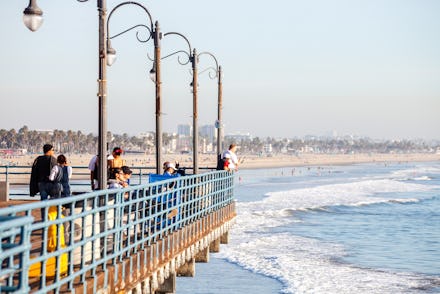The waters of California's coast are acidifying at a concerning rate

The waters off the coast of California are acidifying at a rate greater than the rest of the world, says a new report, and it might not be good news for the marine life or humans who depend on the Pacific. The study, published Monday in Nature Geoscience, suggests that climate change is changing the acidity of the sea as it absorbs more carbon dioxide in the air. This change in pH has already affected the shells in certain types of plankton.
The shelled plankton, called planktonic foraminifera, were key to the study. Emily Osborne, the lead author of the paper, and her research team analyzed nearly 2,000 shells of fossilized plankton to figure out the history of the acidification of California's coast. When the ocean is more acidic, the shells are thinner and weaker. When the ocean is less acidic, they grow thicker shells that are strong with calcium.
By observing when the shells were thicker and thinner, Osborne's team could determine when the ocean was more acidic and how it impacted the plankton. Her team confirmed that, although there were natural instances of acidification in the past, the consistently thinner shells throughout years when carbon dioxide levels in the air were higher meant that acidity levels are consistently rising.
The findings are worrying. Although oceanic ecosystems have the ability to adapt to some changes in the climate, Osborne is concerned about how much they can handle before they're overwhelmed.
"The system is adapted to experience and be able to thrive in a variable environment," she said to NBC News, "but when you add extra stress, these changes become more extreme."
How extreme is still in question. To the research team, this study confirmed that acidification changes as carbon levels in the atmosphere change. But more research is necessary to figure out the long-term impact of the continuing acidification and stress on the ocean. Because, as with anything involving climate change, it's not just acidification that's going to hurt the sea — it's everything that happens all at once.
"There are different stressors like warmer temperatures, decreased oxygen concentration, and multiple other things happening in concert to affect these species," Osborne pointed out. "There's a vast amount of research that has happened and continues to happen to get at what the responses will be and what it means broadly in terms of how ecosystems will respond."
The increase in acidity and the effects of climate change on California's coast has already cost the state in the past. In 2015, California had no choice but to close down fisheries in response to toxic algae that flourished due to warmer waters.
"The extreme marine heat wave caused algae to bloom and produce copious amounts of domoic acid, a powerful neurotoxin that built up at the bottom of the food chain, including in the meat of Dungeness crabs," reported a Gizmodo article in 2018. "Any crabs or other fish where domoic acid is present at levels greater than 30 parts per million is deemed unsafe to eat and cause severe stomach problems or even death."
West Coast fishermen have launched lawsuits against fossil fuel companies for continuing to account for more than half of the ocean's growing acidity despite their own research confirming the risks of global warming. It's but one sign of many that shows how important it is to understand our now-changing waters. Research like this only continues to be crucial as ocean-reliant, coastal and indigenous communities remain vulnerable to the impact of climate change.